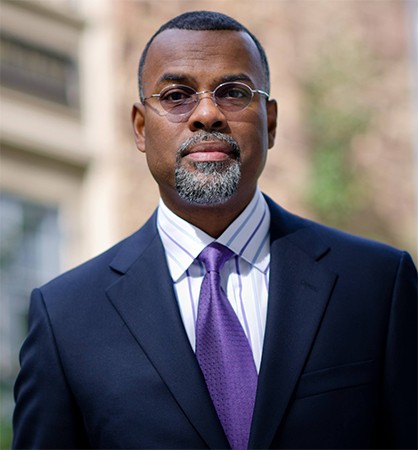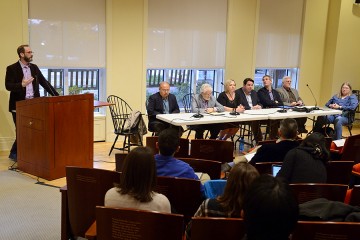
Image caption: Eddie S. Glaude Jr.
How do communities incorporate multiple perspectives, experiences, and points of view?
That key and timely question will be explored through a new campus initiative, The Johns Hopkins University Project on American Pluralism. The three-year program that involves campus and community events, undergraduate classes, and a book series with Johns Hopkins University Press, is funded through a grant from Baltimore's Kolker-Saxon-Hallock Family Foundation.
"Pluralism is a persistent state of diversity where a variety of distinct ethnic, religious, racial, and cultural groups coexist," said Adam Sheingate, chairman of JHU's Department of Political Science. "How does one build a community that embraces those values?"
The inaugural event for the project is a lecture by Eddie S. Glaude Jr., a professor of religion at Princeton University and chairman of the university's Center for African American Studies. Glaude will give a talk titled "Standing in the Breach: Fugitive Democracy and the Work of Ella Baker." Baker was an influential figure in the Civil Rights movement who recognized the importance of grass-roots participation in promoting social change.
Glaude's talk will be at 6 p.m., Thursday, April 20 in the Bunting Meyerhoff Interfaith and Community Service Center at 3509 N. Charles St.
The next day, Glaude will join Sheingate and other scholars for a roundtable discussion on diversity and democracy. The panel will include P.J. Brendese, a Johns Hopkins assistant professor of political science; Jessica Marie Johnson, a Johns Hopkins assistant professor of history; and Adam Culver, an adjunct professor of humanistic studies at the Maryland Institute College of Art. Panelists will discuss how communities come together to act collectively while recognizing and valuing difference and diversity of minority groups and opinions.
The roundtable will begin at 3:30 p.m. on Friday, April 21 in Hodson Hall, room 310.
Sheingate foresees a series of books, to be published by Johns Hopkins University Press, based on material from the project.
Political Science graduate student Christopher Forster-Smith, recipient of a pre-doctoral fellowship funded through the pluralism project, is teaching an undergraduate seminar to compliment the programming called "Pluralism, Debt and Democracy." The course examines how issues of pluralism intersect with economics and politics. Next year the project will begin offering undergraduate research grants for students who want to pursue pluralism-related projects.
"These are very pressing questions right now," Sheingate said. "We're seeing a rise of nationalist sentiments in the United States and around the globe organized around the exclusion of those who are different. But we live in a diverse world and we have to think about how to foster pluralism, and how our communities—including the university community—can contribute to that process."
Posted in University News, Politics+Society
Tagged diversity, political science, politics








